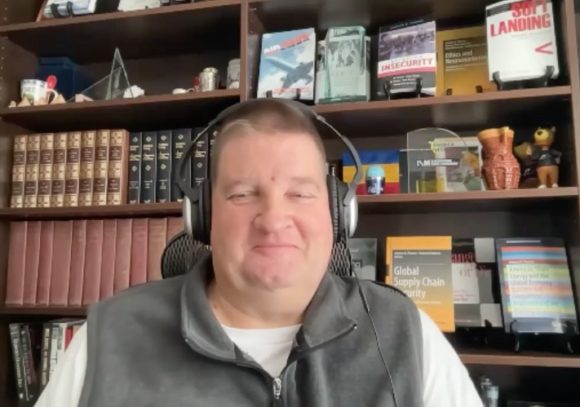Nobody knows how the current tragic war in Ukraine will play out, but I hope that those listening to the second half of our interview with Dr. Andrew R. Thomas will get a little bit of new insight into how the conflict fits into the world’s energy economy.
Andrew is an author and business professor at University of Akron. In 2018, he published a book called American Shale Energy and the Global Economy. He also published a book in 2014 called Geopolitics, Development and National Security, Romania and Moldova at the Crossroads. His latest book coming out in 2022, is about the Panama Canal, The Canal of Panama and Globalization: Growth and Challenges in the 21st Century.
Scroll down to read more and listen to the podcast. Or listen on your phone with Google Podcasts, Apple Podcasts, Spotify, or your favorite app.
Find us on Social:
Facebook: https://www.facebook.com/swarfcast
Instagram: https://www.instagram.com/swarfcast/
LinkedIn: https://www.linkedin.com/company/todays-machining-world/
Twitter: https://twitter.com/tmwswarfblog
Main Points
Where Ukraine fits into the current situation of Europe
[02:17] Andrew points out that the Russia has been at war with Ukraine for eight years, starting with invading Crimea. The rest of the world did very little in response, partly because United States was already in Afghanistan and Iraq. The US imposed a few sanctions to appease the media and try to demonstrate it was doing something, but Russia never faced real consequences for its actions from the US or Europe. People didn’t realize what had been happening until Russia ratcheted up the violence in the last few weeks.
What the Ukraine-Russia Issue means for Global Energy
[03:54] Andrew says the war in Ukraine is going to put a lot more unpredictability into the world’s energy system. When nations do not buy Russian energy in order to punish Putin, it dramatically alters global energy production, pricing, and availability. In the past the variable in the energy economy was energy suppliers who refused to sell, but in the current situation we have energy consumers saying they are not going to buy.
Andrew says that companies cannot instantly start mining more oil and gas. It will take several quarters to “turn the spigot on.”
Canada Mining for Oil and Gas in the Tar Sands
[08:17] Before fracking took off in the United States, the Canadians had figured out how to extract oil and natural gas from tar sands. Tar sands contain a lot of energy, but extracting it is a very intensive and costly process. When oil prices were shooting up in the early 21st Century, processing oil from the tar sands made more sense.
The Environmental Aspects Mining Tar Sands
[08:51] A key issue with mining in the tar sands is that if it’s not managed properly the environmental damage can be huge. This makes it an expensive process. It requires a massive amount land, water, and labor, and can produce a lot of residue. Because we have been living in an era, starting with the fracking revolution, where the price of energy has been pretty low, mining in tar sands has not been that attractive. But if oil stays consistently at $120-$150 a barrel, there is a good chance for investment and activity going in that direction.
Is Putin “putting the Soviet Union back together?”
[10:10] Putin cannot to put the Soviet Union back together because that would involve many other states that are now in European Union and NATO. Currently, Russia is faced with several ongoing crises. One is a demographic challenge. The life expectancy in Russia is low, and Russians are not having many children.
Putin is on the defensive. Russia has a lot of territories to defend. With the expansion of NATO and Romania joining the European Union, those organizations push right to the boundaries of Ukraine, which historically has been a buffer for Russia. Putin views NATO’s expansion near Russia’s borders as an offensive gesture. He does not want to see military bases and nuclear missiles pointed at Russia from such a close range. This fear is similar to what the United States felt when missiles were pointed at it from Cuba in 1962.
[12:55] Belarus is playing a very important role in facilitating the invasion of Ukraine. Russian troops have used Belarus to enter into Ukrainian territory. Rather than a reconstruction of the Soviet Union we are witnessing an alliance network in Eastern Europe, made up of Belarus, Russia, Moldova, and parts of Ukraine. This is a reconstitution of some elements of the Soviet state as it existed in that portion of the Black Sea region.
Timing of the Invasion
[13:28] It seems as though Putin timed the recent invasion carefully. The United States will not have reconstituted its military following the wars of Afghanistan and Iraq until 2028, according to the latest DOD estimate. Europe doesn’t want to get into a conflict. The United States does not want to send American soldiers anywhere to fight. Also, Andrew says that he does not think Russia would have invaded if it did not have China’s blessing. Russia needs China’s help to withstand the sanctions from Europe and the US.
The Panama Canal
[17:48] The Panama canal was originally built to avoid developing a 2-ocean fleet navy. Yet, within 25 years after World War Two, the canal was rendered useless because US had created a multi-ocean fleet navy, and its ships were too big to fit through it. Eventually, President Carter gave the canal back to a dictatorial government of Panama, which the country has done a brilliant job running. Panama has made more money with the canal in the last 20 years than the US did in the entire time it ran it.
In 2006, Panama decided to invest billions of dollars, about 15% of the country’s GDP, to expand the canal to handle larger ships. This timed well with the fracking revolution in the US. The US can now send ships transporting liquefied natural gas (LNG) to Europe and Asia through the expanded canal. The canal is also being used for transporting agricultural goods to Asia from Argentina and Brazil.
America is reluctant to send troops around the world
[21:09] The United States has become incredibly reluctant to intervene worldwide at a national level. Most people agree that the US exited Afghanistan poorly, but at the same time most Americans are still glad that we left.
The nations of the world are realizing that the United States is not going to be the policemen of the world anymore, that the American people do not have the stomach to send their soldiers and their treasure to fight in faraway places. The US is spending less money on its global military, from 60% 30 years ago at the end of the cold war to around 40% today. Other countries are increasing their spending on their own defense because they know the US is not going to defend them. Andrew thinks we’re going to enter back into a period that will be much more dangerous, unpredictable, and violent.
Has the Green Energy Movement reached its peak ?
[26:07] Andrew says the European Union admitted it was impractical to reach its goal to sustain itself without fossil fuels in the coming decades when it quietly reclassified natural gas as a “renewable” in January.
Learn more about Dr. Andrew R. Thomas at https://andrewrthomas.us/
Question: Have you donated to help Ukraine? If so, how have you done it?
Podcast: Play in new window | Download




